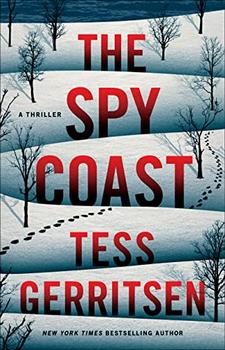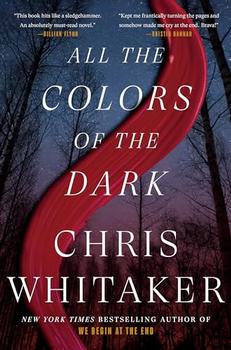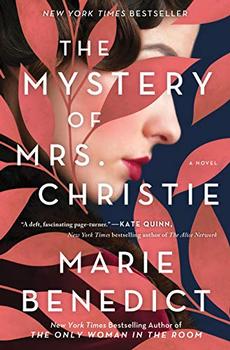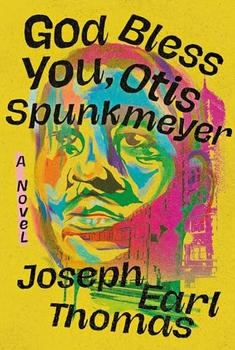
 Cloggie Downunder
Excellent
Cloggie Downunder
Excellent
The Spy Coast is the first book in the Martini Club series by award-winning, best-selling American author, Tess Gerritsen. When someone is asking about her at the post office in Purity on the Maine coast, Maggie Bird is on immediate alert. She has had Blackberry Farm for two years and is happy raising chickens and warding off foxes. She has nice neighbours and regularly gets together with some other villagers for book club martinis and a meal.
The young woman she finds in her kitchen when she returns home is a CIA operative who brings news of a data breach, and wants to know if Maggie can point them to a former operative who has disappeared. It stirs up unwanted memories of an earlier operation that saw her quitting the CIA and trying to find a place under the radar to exist peacefully. Until now, that place was Purity.
When that same young woman then turns up in Maggie’s driveway with marks of torture and two bullets in her brain, Acting Police Chief Jo Thibodeau gets involved. But so do Maggie’s book club friends, who pretend an amateur interest in crime solving, but whose knowledge, contacts and talents belie that pretence.
Jo has to hand the case over to State Police, but gets to see Maggie’s CCTV footage of the drop, and keeps tabs on their progress. She is as puzzled as the local ME when the body is whisked off to Boston mid-autopsy, now under another agency’s control.
But when an attempt is made on Maggie’s life, her really friends spring into action, and Jo is frustrated at how much they know about the attack before she does. Maggie reluctantly reveals the details of Operation Cyrano, something that went down in Malta sixteen years ago, successful for the Agency, less so for her personally.
Once they determine from where the threat is coming, some are hopping on planes while others hold the fort and provide back-up. Before matters are resolved, there are more assassinations, a kidnap, and quite a bit of action.
Gerritsen’s plot takes a few unexpected turns, the dialogue is often blackly funny, and the settings are well-rendered. More of her clever and quirky cast “five old spies with five lifetimes’ worth of experience. Retired does not mean useless. Everyone here has brought their individual tricks of the trade”, of the acting chief of police, and of others in small town Maine will be most welcome. Martini Club #2 is eagerly anticipated.
This unbiased review is from an uncorrected proof copy provided by NetGalley and Thomas & Mercer.

 Cathryn Conroy
A Highly Readable History Book: Deep Dive into the People, Places, and Events That Caused the Civil War
Cathryn Conroy
A Highly Readable History Book: Deep Dive into the People, Places, and Events That Caused the Civil War
Why did the Civil War happen? How did it start? I'm not talking about who fired the first shots at and from Fort Sumter off the coast of Charleston, South Carolina, although that is an important and fascinating part of this book. I'm talking about the actions, misdeeds, speeches, blatant lies, intrigues, fears, and distrust between Northerners and Southerners that set in motion this tragic, bloody war.
The answers are in this book by Erik Larson, and some of it reminds me of our current divisive and polarized political climate. There is a warning here: As George Santayana wrote in 1905, "Those who cannot remember the past are condemned to repeat it."
This highly readable history book takes a deep dive into the stories of people, places, and events from November 1860 when Abraham Lincoln was elected as our 16th president to April 1861 with the surrender of Fort Sumter.
It dramatically zeroes in on the causes of the Civil War as depicted in the major and minor players, as well as the effect of specific events, including the Union occupying and arming Fort Sumter along with its hero commander Major Robert Anderson, the secession of Southern states one by one, the presidential election of Abraham Lincoln, and the almost criminal inaction and ineptitude of Lincoln's predecessor, James Buchanan, to do anything to stop the South from secession and tamp down the incensed and angry rhetoric. Most important of all is the role slavery played in this war—from Northern repugnance to Southern insistence it was all about "state's rights."
Do read the introduction, a note to readers that is titled "Dark Magic." It is Larson's prescient thoughts about being well into the research for this book about the saga of Fort Sumter as he watched on television the Capitol assault on January 6, 2021. He writes, "I had the eerie feeling that present and past had merged."
One clever ploy: Each section of the book is introduced with a pertinent part of "The Code Duello," which in its entirety is a detailed explanation of the code of honor for a duel. The creative effect is to change the Civil War into a national duel, which it seemingly was as it was cloaked—at least in the early months—in chivalry's code of honor.

 Cathryn Conroy
A Thoughtful, Ingeniously Plotted Novel About the Choices We Make with the Life We've Been Given
Cathryn Conroy
A Thoughtful, Ingeniously Plotted Novel About the Choices We Make with the Life We've Been Given
This is a multigenerational saga about a Chinese-American family that will take you from the 1950s rice paddies in the southern basin of China's Yangtze River to Mao's 1960s Cultural Revolution to 9/11 in New York City to the hot-shot San Francisco tech scene of the 2020s. It's a can't-put-it-down read that is part historical novel, part romance, and part coming-of-age tale.
Written by Rachel Khong, this is the story of May and Charles, two university students who aren't in love but join together to flee Mao's repressive China in the 1960s. After a few years in Hong Kong, they emigrate to the United States, where they get jobs as scientists working on the connection between DNA and genetic engineering. When the company changes hands, they move to Florida. May and Charles have one child, a daughter named Lily. She is a great disappointment to them. Lily loves art, but is not talented enough to be an artist herself. She floats around New York City, barely financially solvent, until she meets Matthew, a tall, blond-haired, blue-eyed rich American. They fall in love and marry. They have a son named Nick. When Lily finds out something nefarious, unethical, and highly reprehensible that her mother did to Lily when Lily was just a little girl, and later to her infant son, she flees, swearing to never speak to her mother again.
This plot summary above is told in chronological order. The book is wildly different, beginning with Lily and Matthew's romance in 2000, continuing with Nick's coming-of-age story in the 2020s, and ending with May's incredible, eyepopping tale that begins in the 1950s. It is only at the very end that the three stories finally come together.
The three tales are very different, so different that the novel reads more like three novellas. Lily and Matthew's romance is a sweet, ChickLit tale. (Don't be fooled! The rest of the novel is not like that.) Nick's coming-of-age story drags on a bit too long, told in the naïve voice of a teenager/young adult. And finally, the crux of the novel—its real heart and soul—is told in May's astonishing life story.
Ingeniously plotted and written with insight and candor, this is a thoughtful novel about the choices we make with the life we are given. It is a story about family, race, and inheritance. It is a story about fortune—and that word's multiple senses of meaning. I found the novel to be intriguing and compelling as it examines what it means to be a "real" American, as well as a good human being.

She Treads Softly
scathing portrait of a marriage
Liars by Sarah Manguso is a very highly recommended scathing portrait of a marriage. Due to the brutally honesty revelations of the relationship Liars is not an easy novel to read and for some readers it will bring up painful memories or experiences.
Jane, a writer, meets John Bridge, a filmmaker, and the two fall in love, marry, and plan to continue to both have fulfilling, creative lives. When their child is born, Jane is thrilled, but is also thrust into the role of main caretaker, and cleaner, while John is often absent, doing what he wants. She is now a wife and mother whose life is overtaken by John’s ambitions, whims, and ego. Jane says, "I was in charge of everything and in control of nothing." John frequently moves them all across the country as he pursues new jobs, another form of control, while never admitting to any mistakes.
Jane tries to keep her writing and marriage going throughout all the upheavals. Her health suffers, both physical and mental. She says something that many women face, "My time, which is to say the time that was mine, for me alone, had disappeared. And at once I understood why I hadn't felt like myself in years. My own time - my own life - had disappeared, been overtaken." The novel follows their 14 year relationship. Readers know John will be divorcing her. It is clear from the start. Jane is the narrator of the story and includes within her account, her personal writing about the issues in her marriage and how marriage can make liars of us.
Honestly, this is an impeccably written but an emotionally draining novel to read, especially if you have experienced some of the same things Jane did. I appreciate Manguso naming her main characters John and Jane, common names, and having the child simply be the child. Many readers will be projecting themselves and their personal experiences into the lives of the characters. I saved many quotes from Liars, including this true fact: "He said that the clearest indication of cheating was contempt on the part of the cheating spouse."
Liars is presented as fiction, but while reading it does not feel like fiction. It feels like a realistic, raw memoir about a failing marriage. Thanks to Random House/Hogarth for providing me with an advance reader's copy via NetGalley. My review is voluntary and expresses my honest opinion.

 Cloggie Downunder
literary crime fiction at its best
Cloggie Downunder
literary crime fiction at its best
4.5
“People around here seemed to live in a cloud of defeat, self-wrought and inherited. Whites had the lost cause; Blacks had slavery.”
Holy City is the first novel by American poet, photographer and author, Henry Wise. After a decade in Virginia’s Holy City, Richmond, Will Seems returns to his hometown of Dawn and works as a Deputy with the Euphoria County Sheriff’s Department. He doesn’t share his reason for returning although some make educated guesses.
When he spots a fire at the Turkey Creek home of former high school football star, Tom Janders, he risks his life to drag Tom out of the burning house. When Sheriff Jefferson Mills arrives, he immediately rules it murder: Tom has been stabbed in the back. Sawmill worker, Zeke Hathom is spotted fleeing the scene, and Will reluctantly arrests him. The Sheriff has soon charged Zeke with Tom’s murder, but neither Will, nor the victim’s mother, nor many of the town folk, are convinced that Zeke could kill his neighbour.
Will finds Zeke’s story plausible and, while prints on the murder weapon implicate him, Will feels he owes Zeke and his family, so he decides to properly investigate despite the Sheriff’s lukewarm response. Zeke’s wife, Floressa has no confidence that justice will be served. She engages disgraced Richmond cop, Bennico Watts to solve the murder and exonerate her husband. And she insists that Bennico, a woman who always works alone, teams up with Will.
Will has a problem with the idea too: he’s harbouring a fugitive in his dilapidated old family home. And his opposition to the Sheriff’s attitude threatens his access to information about the case. There’s talk of a cash debt, and some disgruntled gamblers who lost big to Tom on the night he died. Will (and Bennico) are thorough in their enquiries, becoming steadily more certain that Zeke is innocent and someone else deserves their scrutiny.
The astute reader will wonder early on about the Sheriff’s motivation and, while the murderer is revealed to the reader at the halfway mark, the journey to this being generally acknowledged, and the aftermath, definitely keep the pages turning. Readers may appreciate a trigger warning: there are several explicit descriptions of deviant sexual behaviour, and the ambiguous ending may not be to everyone’s liking.
Wise’s characters are complex, and he certainly challenges them with difficult dilemmas. His protagonist is plagued with a long-standing guilt that affects his reasoning. Bennico has Will summed up fairly quickly: “wearing that badge just to carry out a personal vendetta you haven’t had the courage to complete.”
He does give them some wise words: “You have to ask yourself if you really want to solve a problem or if you’ve learned to use it as a crutch. Sometimes, we learn to savor our pain. Ask yourself if this is more about some guilt you feel than it is about bringing them to justice. No act undoes the past” and insightful observations “Things that don’t get said are just as true as those that do.”
He fills his debut novel with gorgeous descriptive prose: “They could hear, beyond the roar of wind through the open windows, the life buzzing and skittering out over the wide openness of the fields, ending in trees and vines thick and tall over the road, the sound of cicadas and other insects ebbing and searing, subsiding again when the land opened up to new fields where tall trees like explosions broke the sky” and “They drove, the sun long gone, the glowing headlights scanning the cowled land for whatever might emerge, the gradual highway undulating in serpentine curves and straightaways where you could see, far ahead, the gleaming road like a blade under the moon” are examples.
Atmospheric, haunting and beautifully written, this is literary crime fiction at its best. More of Henry Wise will be eagerly anticipated.
This unbiased review is from an uncorrected proof copy provided by NetGalley and Grove Atlantic.

Jill
Outstanding
ALL THE COLORS OF THE DARK by Chris Whitaker
I read this and listened to the audiobook narrated by, Edoardo Ballerini, who always does an outstanding narration. He is a favorite narrator of mine and I highly recommend the audiobook.
In 1975 in the small town of Monta Clare, in the Ozark mountains of Missouri, young girls are gone missing. When a girl from a wealthy family is being attacked, Patch, a thirteen-year-old boy with one eye who pretends he is a pirate, happens to be in the area and saves her from being taken. What follows changes Patch’s life and others in this small town. This well crafted powerfully written novel is part thriller, suspense, crime fiction, coming-of-age, love story, and Bildungsroman (new word for me, and describes it perfectly).
Patch and Saint, a teenage girl, are the two main characters and have a very special bond of friendship. This novel unfolds over decades as Patch and Saint, navigate their teenage years into adulthood. Both Patch, Saint, and others in this small community live out their lives, forever changed by the tragic events of one year. This complicated story touches on serial killer violence, obsession, loyalty, kindness, memories, dreams, hope, and so much more.
I found myself getting lost in the pages of this beautifully written, character-driven story that I didn’t want to end. This book blew me away, and by far my most favorite read of 2024 thus far. Once again, Chris Whitaker has written another book of sheer brilliance.

 Anthony Conty
Worth the Read
Anthony Conty
Worth the Read
"Kairos," the lesser-known god of fortunate events, lends his name to a post-unification Berlin tale. This story, about the unexpected affair between a married 50-year-old and a 19-year-old, is not your typical romance. Their relationship, with all the elements of a star-crossed meet cute, is a compelling exploration of love and sacrifice, even when their future is uncertain.
American history classes often focus on the fall of the Berlin Wall, a significant event that symbolized the end of the Cold War and the reunification of Germany.
However, the periods before and after this event are equally important in the context of our story. The strong ideologies that defined this era serve as an unwitting backdrop to an unbalanced, dominating love story. In this narrative, the societal and political upheaval, rather than physical boundaries, are the characters' primary concerns, providing a rich historical setting that will inform the reader.
In this story, the young woman and the older gentleman act predictably, but their actions reflect the German landscape in 1987. The societal norms of the time, influenced by the aftermath of the Cold War and the unification of Germany, dictated their choices. Even after translation, the author assumes some political knowledge that required me to look up a few things.
Just past the halfway point, things take a dark turn, which, in retrospect, the author foreshadowed sufficiently. The plot twist, while effective, evoked a sense of discomfort in me, a testament to the author's skill in crafting a compelling narrative. Without revealing too much, realize that it is hard to read about gaslighting and emotional abuse, whether it is a country or a boyfriend committing it.
It all makes for an engaging but squirm-inducing novel. Our generation knows little about German life, but this educates us about it.

 techeditor
Good in the End
techeditor
Good in the End
When I read historical fiction, I always wonder what is truth and what is fiction. But Marie Benedict doesn't make this clear in her Notes or Acknowledgment at the end of THE MYSTERY OF MRS. CHRISTIE. So this is all I know: Agatha Christie really did disappear for a few days and then suddenly show up with no explanation, she really did surf, and she did not really write the "manuscript" alluded to throughout this book.
In the chapters that make up half the book are the supposed manuscript that Christie left for her philandering husband. The main emphasis is on the duty Christie felt she owed her husband. Remember, this book takes place during the 1920s, when many felt that the proper role of wives was to subjugate themselves to their husbands. These descriptions got old and tiresome.
Until nearly the end, every other chapter is Christie's manuscript. Probably that is fiction. The other chapters take place during the disappearance and the hunt for her. This is when we hear about the husband's woes, and this too, I presume, is fiction. But Benedict says she did so much research for this book, some of this must be nonfiction.
My favorite parts of THE MYSTERY OF MRS. CHRISTIE are the last chapters, which are not her manuscript but just Christie speaking in first person. In the end, this book is both imaginative, after all, and enjoyable.

Ann E Beman
One extended shift in a trauma center, told in richly detailed stream-of-consciousness
The cover of God Bless You, Otis Spunkmeyer shows a young Black man's face overlaying an institutional-looking building in the background. The lines of the drawing, specifically of the man's head, blur, as if his multicolored facets aren't yet able to sustain a stable image. It beautifully represents the gist of Joseph Earl Thomas's debut novel, which is told over the course of one hectic shift at a Philadelphia hospital. Joseph Thomas, who not coincidentally shares the author's name, is a med tech in the emergency department, where he knows every other patient, including his mother, presumed biological father, uncle, great-grandmother.
"A boy who used to beat me up is here for STD testing."
"In the trauma bay there's a lanky girl I knew from middle school named Diamond."
I say that the setting is the hospital, but really it's Joey's mind. He weaves narration of his daily ER routine with flashbacks from gaming with his kids the night before, from his own impoverished childhood, from his tour in Iraq as an army medic, and so on. Throughout his stream-of-consciousness narration, he speaks of hunger and trauma and when is his bff Ray gonna show up with Joey's hoagie and Otis Spunkmeyer muffin?
Therein lies the hook.
This book is phenomenal in how it captures the focus and distraction of both a mind and a trauma center in chaos. Its intense but intimate language is not easy to begin, but by about 15 percent in, I began to see the method in the seeming madness and I was drawn in, mesmerized by its genius. I was already a fan of Thomas's memoir Sink, but the two together make me an even more avid fan.
Thanks to Grand Central Publishing and NetGalley for an opportunity to read an advanced reader copy and share my opinion of this book.

Jill
Engaging Read
THE ROSE ARBOR by Rhys Bowen
Thanks to BookBrowse and Lake Union Publishing for the ARC book of this to read.
Loved the beautiful cover art on the jacket of this book and also on the book itself. Really beautifully done.
Female empowerment is important to Rhys Bowen’s characters. I like that she writes of women who’ve been underestimated and bringing them into the spotlight; as she has done with this story of Liz Houghton. London: 1968. Liz has been doing her job perfunctorily as an obit writer at a London newspaper. When a young girl goes missing, Liz already has a scoop because her best friend, Marisa, is a police officer assigned to the case. Liz thinks this could possibly be her break in journalism.
Liz accompanies Marisa to Dorset, where another disturbing discovery is made from over two decades earlier. Three girls disappeared when the military requisitioned the village of Tydeham during the war and left it in ruins. Liz is drawn to this village and isn’t sure why. The place seems strangely familiar though she’s never seen this village. Why is this so? And why after all these years would there be a link to the missing girls here?
A mystery fused in history, with plot twists, romance, family issues, secrets, misogyny, the chaos of the government program that moved children away from unsafe villages/cities, and the sacrifices the citizens endured during wartime. The character descriptions and dialogue felt very authentic to me. This is my first read by Rhys Bowen and enjoyed the narrative and I am looking forward to reading more of her books.





